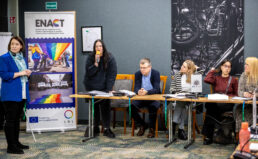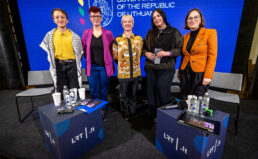On 30 October 2023 Lithuanian Gay League together with the Seimas Ombudspersons’ Office organised an inter-institutional roundtable discussion on the implementation of the EU LGBTIQ Equality Strategy and the needs for a national LGBTIQ Human Rights Plan, which was attended by more than 20 representatives from ministries, the Office of the Ombudsman for Equality of Opportunities, the Office of the Inspector of Journalists’ Ethics, the Ombudsman for Protection of Children’s Rights and non-governmental organisations in the field of human rights.
The experts noted that Lithuania has so far failed to adopt a national human rights plan, and that the current state-level strategic planning documents have only a very limited integration of LGBTIQ equality issues, which does not allow for qualitative changes, while some LGBTIQ issues have not been addressed at all.
Dr. Erika Leonaitė, Head of the Seimas Ombudsmen’s Office, said at the meeting that a national strategy or a plan covering the rights of LGBTIQ persons would provide a legal basis for action, noting that issues of the rights of LGBTIQ persons, regardless of the crises, emergencies or challenges that exist, are important and need to be addressed now.
“A strategy or plan should be the result of a concerted effort that commits to further action, as well as a consensus that significant change is needed in this area,” said Dr Leonaitė.
Human rights activists from the non-governmental sector who participated in the discussion mentioned the lack of leadership of the Government and the Seimas in addressing human rights issues in a comprehensive manner, while representatives of the institutions also stressed the need to provide resources.
However, the need for a national LGBTIQ rights plan to coordinate activities between institutions, to identify strategic priorities and sources of funding, and to ensure the sustainability and continuity of existing activities was supported by all the participants in the roundtable discussion.
“We have seen how fragile the protection of LGBTIQ rights is in Lithuania. In September, a legitimate protest by LGBTIQ activists at the Seimas was dispersed and disrupted by a hate-spewing MP and a marginal group allegedly fighting for the traditional family,” LGL leader Vladimir Simonko said after the meeting.
“With the Seimas elections approaching, some politicians are trying to continue scoring points from homophobia, but Lithuanian institutions are not only politicians, but also experts, scientists and other professionals, and as a response to anti-democratic movements, we need to strengthen the institutional, academic and non-governmental core of experts, promote intersectoral cooperation, and ensure that the visibility of the LGBTIQ community is high and that community is active in public life,” said V. Simonko.
Photo courstesy: Augustas Didžgalvis
The Seimas also failed to show leadership on human rights issues in the vote on 7 November, when it rejected the initiative of the Ministry of Justice of the Republic of Lithuania to lift the ban on the dissemination of information on LGBTIQ issues to minors. The amendment was submitted to the Seimas in order to implement a ruling of the European Court of Human Rights, which ruled that Lithuania had unlawfully restricted the freedom of speech and expression when a collection of fairy tales by Neringa Dangvydė Macate (1975-2020), entitled “The Amber Heart”, which also described romantic relationships between same-sex characters, was withdrawn from the market in 2014.
“By voting this way, Lithuanian politicians have, in my opinion, demonstrated that they are only interested in their own political interests and not in the common interests of Lithuania, let alone the standards of human rights protection. Similar regulation is present in Hungary, which is the subject of an international case before the Court of Justice of the European Union for systemic violations of LGBTIQ rights,” commented Monika Antanaitytė, a legal counsel representing LGL.
“The situation is such that, in terms of LGBTIQ equality, at least formally speaking, we are lagging behind even some of the countries that are still in the process of integrating into the European Union. Bosnia and Herzegovina and Albania have recently adopted LGBTIQ rights plans, while Montenegro introduced same-sex partnerships a few years ago,” said Monika Antanaitytė.
The Seimas has so far failed to adopt any law relevant to the protection of LGBTIQ rights. At the end of May 2023, the Seimas approved the draft Civil Union Law by a minimum majority after a debate, but no date has been set for a final vote on its adoption. Meanwhile, a legislative initiative in the Government’s 2020-2024 legislative plan to allow for an extra-judicial change of the gender record in personal documents has also not been presented.
LGL would like to thank the Friedrich Ebert Foundation for its support in organising the roundtable.


































